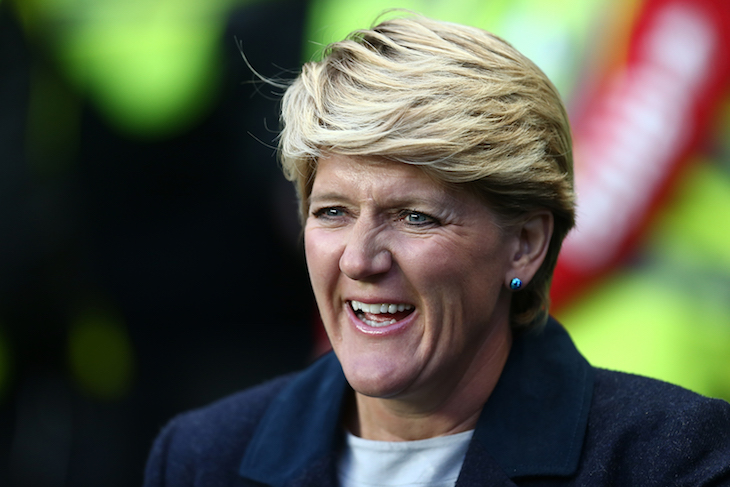This week’s edition of Ramblings with Clare Balding did all the usual things: a walk in the country (cue breathy conversation as we followed her up hill and down dale), braving the elements (there’s always rain at some point) with a dog in tow, and in the company of someone for whom the walk has some meaning. But then the programme took off into something quite unexpected as her walking companion, Christina Edwards, began to explain why this particular ramble, in the heart of Northamptonshire, was so familiar to her, and why they were retracing her steps not in daylight, when the rolling hills and gentle fields could best be appreciated, but as darkness fell.
In Edwards, it soon transpired, the indomitable Balding had met her match, teased for insisting on donning a head torch so that she could see where she was going. Edwards was resolutely unperturbed by the gathering gloom, insisting she had never used a torch, and had never been scared. It was a walk she had done many times when she was younger, and suffering from anorexia nervosa. She would wake up at2 a.m. starving hungry but unable (or rather unwilling) to satisfy her hunger pangs. To tire her body out, she would go for a walk.
‘Do you know why? Do you know what triggered the illness?’ asked Balding.
Edwards believes she can pinpoint it to a time in sixth form when all her friends were studying subjects that led to conversations, relentlessly, pitilessly focused on war, nuclear, chemical, historical, ‘The thought came into my head, I just want to try and tread lightly on this earth. I want to take as little as possible from it.’ This could have sounded fey, but Edwards was looking back on herself as a teenager when such questions can feel of excruciating importance and it made perfect sense because she was so scrupulously honest, stripping back to lay bare.
When a psychologist tried to suggest it was all about her relationship with her mother, she was furious, but, inadvertently, it helped her to realise that, on the contrary, the illness was all about her (‘it wasn’t my mother denying me food’), and if she wanted to get better she needed to do itfor herself.
How did her mother help her? Balding asked.
‘She was endlessly patient with me not-eating.’ Meals carried on as usual, not with food as the central issue but because it was important they all sat down together.
A walk in the country became something much more; an insightful examination of what anorexia nervosa really means to someone who has thought about it, analysed its insidious power, and worked out how to get over it (Edwards now has three children and a new life in New Zealand). It was not billed as part of the Riot Girls season, being celebrated on Radio 4, but could have been. Edwards was fearless in her willingness to face the illness and her own part in it, overturning much of what is currently said about cause and treatment. Balding, too, never fails to impress with her ability to time the right question, and to listen, blending intuition with a blunt directness of approach.
Elsewhere on the network, two great dames of the literary world have been pitted against each other for the season, Margaret Atwood’s transgressive novel The Robber Bride up against Doris Lessing’s sharp study of incompetent radicals, The Good Terrorist. Atwood’s untrustworthy heroine, Zenia, subverts the tale of the male folk monster who lures away gorgeous young brides only to kill them. She seduces in turn the partners and husbands of her three college mates, casting them off as soon as she has got what she wanted. She’s so alluring, so clever and so amoral, a devil in high heels, for whom Atwood has confessed she has far more sympathy than the three (or rather six) victims of Zenia’s wickedness, who are drawn much less vividly, as if in comparison they are cartoon characters, two-dimensional, squashed flat.
In Sarah Wooley’s two-part Sunday-afternoon drama (atmospherically directed by Marion Nancarrow), you could not fail to be seduced by Zenia’s honeyed tones (she was played by Tanya Moodie). The second part had too much plot to sort out and was not quite as spellbinding as the first, but this lingered in the mind, Zenia both appalling and compelling.
Lessing’s The Good Terrorist, dramatised in ten short episodes by Sarah Daniels (and produced by Emma Harding), also has a fearless woman at its heart. The rebellious daughter of a rich family, Alice gets tied up in the Communist Centre Union without realising that it’s her money that her new friends are mostly after, and that their anti-Thatcherite motives are less clear-cut than her own. In spite of her upbringing, she’s the one who knows how to unblock concrete from the toilets in the squat they take over, while at the same time sweet-talking the council to allow them to stay. Set in the 1980s as IRA bombs continue to trouble London, Lessing’s novel (first published in 1985) sounds remarkably dated now, so different have the arguments about male–female relations become, but you can really understand how terrorists are formed.
Got something to add? Join the discussion and comment below.
Get 10 issues for just $10
Subscribe to The Spectator Australia today for the next 10 magazine issues, plus full online access, for just $10.
You might disagree with half of it, but you’ll enjoy reading all of it. Try your first month for free, then just $2 a week for the remainder of your first year.














Comments
Don't miss out
Join the conversation with other Spectator Australia readers. Subscribe to leave a comment.
SUBSCRIBEAlready a subscriber? Log in